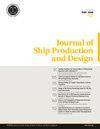Artificial Intelligence (AI) and Knowledge-Based Engineering (KBE) in Ship Design: Bridging Tradition and Technology Through ACQUAINT
IF 0.5
4区 工程技术
Q4 ENGINEERING, MARINE
引用次数: 0
Abstract
Despite the limited use of artificial intelligence/knowledge-based engineering (AI/KBE) in industries with small series or one-off designs, our study demonstrates the technical feasibility and potential benefits of implementing AI/KBE in ship design processes. This research presents the development of “ACQUAINT,” uniquely designed to address the complexities inherent in bespoke shipbuilding. Central to this module is a robust AI-driven inference engine, integrated seamlessly with AutoCAD through a Python-based interface, facilitating a novel approach in shipbuilding’s detail and production design phases. The module’s capability to generate optimal designs autonomously—grounded in a deep understanding of design rules, constraints, and requirements—substantially reduces the reliance on human interaction. Our initial proof of concept with “ACQUAINT” showcases measurable advancements in ship design accuracy and efficiency, highlighting AI KBE’s transformative impact in shipbuilding and setting a foundation for future research and practical applications. ship design; artificial intelligence; knowledge-based engineering; self-learning system; software development; ACQUAINT; CAD/CAM software; computers in construction; computers in design; modernization; ship structure船舶设计中的人工智能 (AI) 和知识工程 (KBE):通过 ACQUAINT 沟通传统与技术
尽管人工智能/基于知识的工程(AI/KBE)在小批量或一次性设计行业的应用有限,但我们的研究证明了在船舶设计过程中实施人工智能/基于知识的工程的技术可行性和潜在优势。本研究介绍了 "ACQUAINT "的开发情况,该模块设计独特,可解决定制船舶建造过程中固有的复杂问题。该模块的核心是一个强大的人工智能推理引擎,通过基于 Python 的界面与 AutoCAD 无缝集成,为造船的细节和生产设计阶段提供了一种新方法。基于对设计规则、约束和要求的深刻理解,该模块能够自主生成最佳设计,从而大大减少了对人机交互的依赖。我们利用 "ACQUAINT "进行的初步概念验证展示了在船舶设计精度和效率方面可衡量的进步,凸显了人工智能 KBE 对造船业的变革性影响,并为未来的研究和实际应用奠定了基础。 船舶设计;人工智能;知识型工程;自学系统;软件开发;ACQUAINT;CAD/CAM 软件;计算机在建筑中的应用;计算机在设计中的应用;现代化;船舶结构
本文章由计算机程序翻译,如有差异,请以英文原文为准。
求助全文
约1分钟内获得全文
求助全文
来源期刊

Journal of Ship Production and Design
ENGINEERING, MARINE-
CiteScore
1.10
自引率
0.00%
发文量
19
期刊介绍:
Original and timely technical papers addressing problems of shipyard techniques and production of merchant and naval ships appear in this quarterly publication. Since its inception, the Journal of Ship Production and Design (formerly the Journal of Ship Production) has been a forum for peer-reviewed, professionally edited papers from academic and industry sources. As such it has influenced the worldwide development of ship production engineering as a fully qualified professional discipline. The expanded scope seeks papers in additional areas, specifically ship design, including design for production, plus other marine technology topics, such as ship operations, shipping economics, and safety. Each issue contains a well-rounded selection of technical papers relevant to marine professionals.
 求助内容:
求助内容: 应助结果提醒方式:
应助结果提醒方式:


